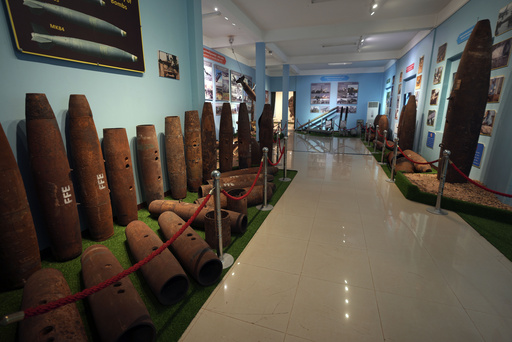
PHNOM PENH, Cambodia — Leaders from around the globe, including the U.N. Secretary-General and Pope Francis, convened on Monday to advocate for the complete cessation of land mine production and usage, despite a rise in their global deployment.
During the fifth review of the International Mine Ban Treaty, also known as the Ottawa Convention, U.N. Secretary-General Antonio Guterres expressed alarm that nearly 25 years after the treaty took effect, certain nations have not only resumed the use of antipersonnel mines but have also neglected their obligations to eliminate these weapons as mandated by the treaty.
Guterres urged member states to adhere to the treaty’s requirements and to resolve the humanitarian and developmental challenges posed by land mines with necessary financial and technical support. He encouraged nations that have yet to join the 164 signatories of the treaty to consider doing so, asserting that a world free of antipersonnel mines is not merely a dream, but a very attainable goal.
From the Vatican, a statement delivered by Cardinal Pietro Parolin on behalf of Pope Francis emphasized the ongoing utilization of antipersonnel land mines and victim-activated explosive devices. He articulated that despite the passage of time since conflicts concluded, these dangerous weapons continue to inflict considerable suffering on civilians, especially children.
Pope Francis called upon nations that have not yet endorsed the treaty to join the effort while also demanding an immediate halt to the production and usage of land mines.
The Ottawa Treaty, which was signed in 1997 and came into effect in 1999, has yet to be adopted by nearly thirty countries, including significant producers and users of land mines like the United States, China, India, Pakistan, South Korea, and Russia.
A recent report from Landmine Monitor indicated that active land mine usage persists in 2023 and 2024, particularly by Russia, Myanmar, Iran, and North Korea. It also reported that non-state armed groups are employing mines in several regions, including Colombia, India, Myanmar, Pakistan, and the Gaza Strip, alongside allegations of usage in more than a half-dozen countries near Africa’s Sahel region.
According to Landmine Monitor, at least 5,757 individuals, primarily civilians, lost their lives or sustained injuries due to land mines and unexploded ordnance last year, with one-third of the casualties being children.
The report pointed out extensive use of antipersonnel mines by Russia in Ukraine. Just last week, the U.S. announced it would also supply Kyiv with antipersonnel mines to hinder Russian advances as part of its ongoing military support.
Guterres highlighted the imminent dangers these mines pose to civilians, asserting that even after hostilities cease, the lingering presence of these indiscriminate weapons can keep future generations in a state of fear and uncertainty.
He commended Cambodia for its substantial demining efforts and its role in sharing knowledge with other nations, as well as contributing to U.N. peacekeeping missions. Cambodia, having suffered deeply from land mines left over from decades of conflict that concluded in 1998, still contains between 4 million and 6 million unexploded mines.
Cambodia has made significant strides towards clearing these mines, with Landmine Monitor reporting that in 2023, Cambodia and Croatia led the world, accounting for 75% of all mine-cleared land, totaling over 200 square kilometers (approximately 80 square miles).
Prime Minister Hun Manet echoed calls for increased participation in the Mine Ban Treaty, expressing gratitude to the global community for their assistance in Cambodia’s mine clearance initiatives. Through concerted efforts, Cambodia has managed to reduce land mine-related casualties from more than 4,300 in 1996 to fewer than 100 annually in the past decade.
“Cambodia has transformed its painful past into a compelling lesson for the world, advocating against the use of antipersonnel mines and emphasizing their lasting effects,” he stated.
